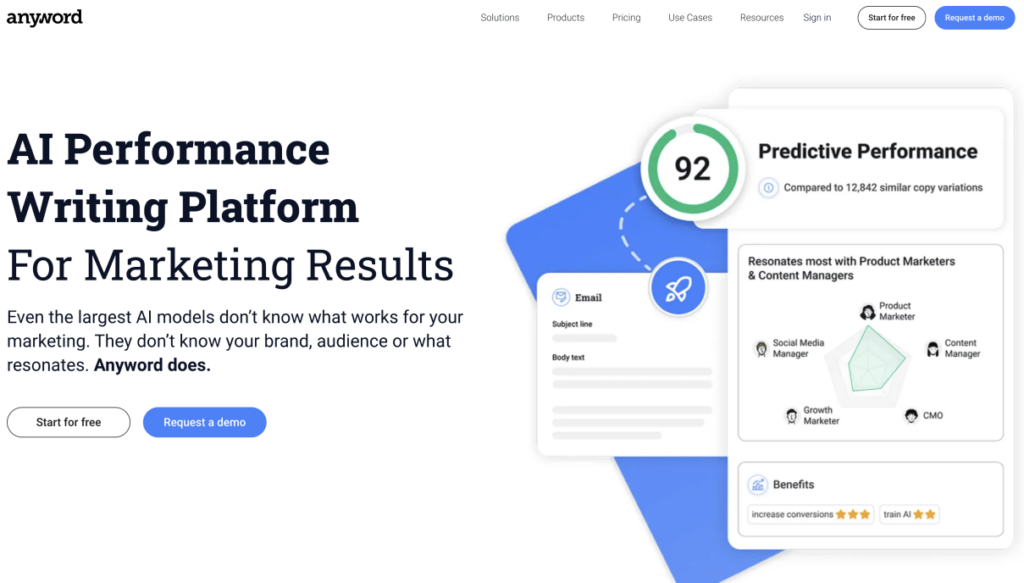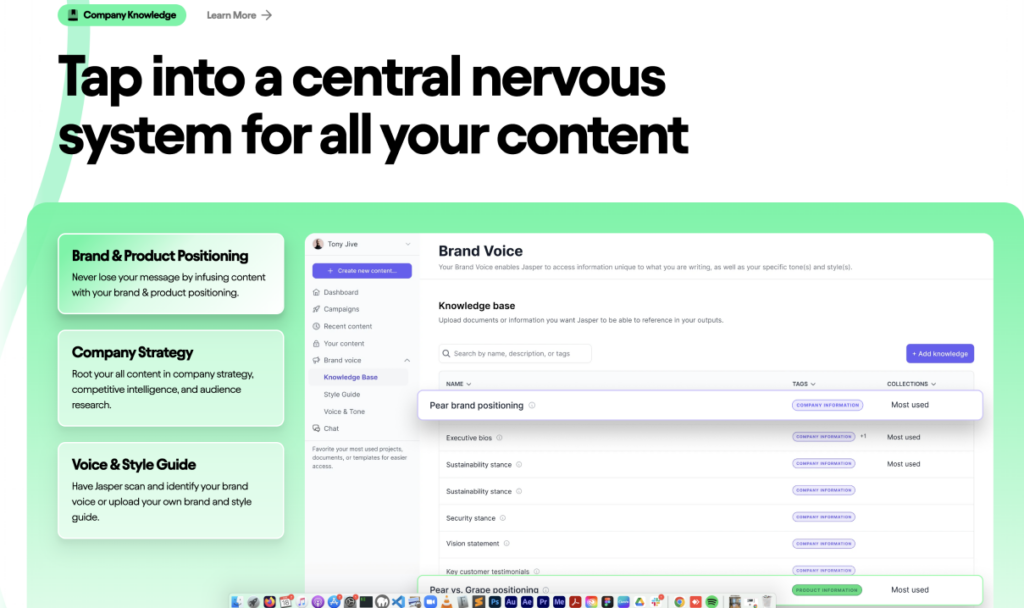
28
DecemberThe Best AI Essay Writers and Writing Tools of 2024
he Best AI Essay Writers and Writing Tools of 2024
We’ve all heard the “it’s not AI that will replace you, but someone using AI” line, and it’s most likely true. But “using AI” is a broad statement. What is the best AI essay writer https://www.linkedin.com/pulse/best-term-paper-writing-services-oksana-popova-zrhqf, for instance? What is the best free AI writer? If we want to get better at it, let’s nuance and define how we want to incorporate AI. What we are trying to find out is which AI tools in particular help the most, for each of the many writing use cases we encounter? And how do you do the AI trend which has swept commerce, art, and education to affect each of us?
Our mission in this post is to answer these questions and get our clients and our readers actionable intelligence on how to start writing with artificial intelligence (Pro tip: Is artificial intelligence capitalized? Not when it’s spelled out).
Our rankings should be useful if you’re applying for a job, writing an essay, crafting a novel, generating social media posts, working up blog post outlines, as well as if you’re looking for the best AI tools for digital marketing.

TWO KEY NON-MARKETING USES: ESSAYS AND RESUME GENERATORS
We came to our AI technology survey with a focus on finding the best AI tools for marketing. But our research revealed people are deeply interested in using AI writers for two non-marketing cases: essay writing and resumes/job application materials. So we included them in our tests.
You might be looking for an essay outline generator or an introduction paragraph generator for a piece you’re trying to write. An AI essay outline generator lets you input the topic or prompt of your essay (“explain the causes of the French Revolution”) and outputs key points as a structure you can use.
Introduction generators for essays do exactly what it sounds like they do. You input the topic or thesis of your essay and what sources you want to reference. They output an intro sentence or a whole paragraph for you.
Are you a job seeker trying to clarify your career goals and prepare materials before you go on the market? You might want a more streamlined alternative to using a “classic” ChatGPT prompt for your cover letter.
AI resume summary generators, professional summary generators, and resume sentence generators can make all those time consuming job applications significantly easier for both applicants and hiring managers. This is especially true for the task of writing a cover letter, or, what’s more likely, many cover letters
OUR AI CONTENT CREATION TEST
So how do you test an AI writer?
We evaluated several factors:
Ease of Use. Namely, do I feel like I’m tuning up the gears of a Victorian-era time machine when I try to generate content with this thing? Does it let me redo prompts easily? How about editing generated text? Where does the text I generate get stored, and is it easily accessible? Are instructions clear?Cost. Free essay outline makers and outline generators are better than highly costly ones.Output Quality. Many people assume all AI-generated text has the same beige quality, like reheated food from an airline dinner service cart. That’s not actually true. (You can skip to our favorite below to find proof). But, when you select a different tone of voice, or add specificity to the prompt for your personal voice, does the output actually change? How much?Integrations. Jasper AI integrates with Surfer SEO, for example, to let you keyword optimize its writing in-app. This wasn’t a huge consideration, but may be useful for marketers who have preferred tools.
OUR AI TEST PROMPTS FOR ESSAYS, COVER LETTERS, RESUMES, AND MORE
“Write a blog post about X for me” does not count as one of the valid Chat GPT prompts for marketing, or any type of effective AI prompt, for that matter. AI works best as a writing aid when you ask it to analyze first, then help it create. Ask it to show you what matters about the topic or industry you have to write about, and only afterwards ask it to assemble that information as an essay organizer tool or pure writer.
The prompts we used to test these tools are representative of what content creators should be asking to understand what they’re writing about better with AI help. That’s the rationale behind why we chose them.
Focus on the Most Important Thing: Act as an expert in [TOPIC]. Make a list of key concepts necessary to understand [TOPIC]. Rank them from most important to least important.
Define a Concept: Prompt: Define [TERM] and provide an example that can be used in everyday life. The definition should be complete but easy to understand, explaining any complicated words if necessary.
Relate Multiple Topics: Describe and explain in simple words the relationship between [CONCEPT 1] and [CONCEPT 2].
Describe Expertise: Act as an expert in [TOPIC OR FIELD] and give me recommendations for [SPECIFIC QUESTION]
Learn Key Terms: What are some key terms I should know about [TOPIC]? Make a list with a short, simple definition of each term.
Learn a Skill: I want to learn [SKILL]. Give me step-by-step instructions on how to learn [SKILL] Start with the basics and move on to the more difficult ones. Keep in mind that I’m a beginner.
Troubleshooting: Act as an expert in [TOPIC]. My goal is to avoid common problems people have with [TOPIC]. Make a list of those problems and how to solve them or prevent them. I am a beginner. Define all complex terms.

OUR SIXTH BEST AI WRITER: INK
Quick Summary: INK offers catchy video explainers on its website. Actually, there’s an entire Boot Camp designed to help you make full use of its functionality. But its clunky interface and lack of transparency during use set back what could be a great product.
Full Explanation: We soon realized that any AI writing tool is essentially a different type of branded packaging or set of levers and dials operating a Chat-GPT 3 or 4 API. You pick one or the other, most of the time, because of how well those dials work.
INK sells itself based on versatility. It has been developed by a very kind-seeming set of people, who narrate walkthrough videos that show up whenever you proceed to a new section of the app. The app is preferable to using INK in a browser.
Good vibes, sadly, are the place where a lot of INK’s benefits run out. When I gave it a long copy prompt, INK produced expert-sounding writing, making it seem like an excellent intro generator for an essay, perhaps.
After I tested its ability to paraphrase a source, however, it failed its own anti-plagiarism test! A paraphrase that remains in fair use is…the entire point of using these tools. Yikes.
Text in INK was also cumbersome to edit and re-generate once it was produced. You also can’t pause INK mid-generation if you decide to use a different prompt.
Unfortunately, INK’s instructions and examples in bad English (“Write sales copy about threadmills”) inhibit exploration and digestion of the product as a curious user. With this kind of issue at hand, it would be hard to recommend INK out of the AI writing tools we surveyed as one of the best AI essay writers.

OUR FIFTH BEST AI WRITER: ANYWORD
Quick Summary: Anyword is easy to use, and offers many refinements if you’re trying to use AI for content marketing, branding, social media campaigns, or product descriptions. The problem is that its ouput, unless you really dial it in, can be outrageous.
Full Explanation: Anyword has that helpful robot butler effect of only requiring answers to a few questions before it begins the writing process and gives you its best work. Unfortunately, you then have to deal with its best work.
One major value proposition by Anyword for itself is data-driven audience segmentation and its ability to create highly specific, specialized brand voices.
In practice, it may be unfair to expect a robot to know what a “playful” tone means.
If you ask it to sound “playful” or “casual” tone, Anyword can go borderline deranged.
When I asked it to quickly generate landing page copy for a social media marketing service from a marketing firm, for instance, it replied: “This isn’t just about vanity metrics, this is a leap into the pulsating world of content streams, click-through highways, and audience interaction galaxy. Are you ready?”
I wasn’t ready. And, despite its promised refinements, Anyword’s landing pages and social media posts seemed generic, and its blog posts were too broad, serving merely as a guidepost when juxtaposed with our favorite tool (coming in Part 2 of this post). It seems like more of an advertising and marketing tool, rather than one of the best AI essay writers.

OUR FOURTH BEST AI WRITER: JASPER
Quick Summary: Power, automation, data, expense. Or, in its own words, “not just faster, better.” Jasper connects you to an ecosystem of fellow users, multiple LLMs, and manifold features to automate your marketing tasks. In this, it’s unmatched. But even with all this infrastructure, it’s unclear if its output is significantly better than another writing tool.
Full Explanation: Jasper presents itself as the Answer, the System, or, from its tagline, your “AI co-pilot.” It’s by far the most “branded” of these tools, listing Fortune 500 clients and dazzling with a flashy, sophisticated website.
Its automation features, which let it handle content and copy generation at multiple points of your marketing strategy, are impressive and systematic. They would be more impressive if you could push its writing through without revising it.
Jasper’s Brand Voice capability, for instance, can train itself on marketing copy from many different locations; what it put out was, charitably, recognizably “branded” and a good start, with some cool ideas, but, uncharitably, more like a parody. Interestingly, the Brand Voice feature did a better job describing our agency’s brand voice than it did actually replicating it.
Is this worth $50 a month to an agency? Maybe, but it charges you extra to plagiarism test its long-form output. Not cool. And it’s unlikely anyone looking for the best AI essay outline writers for an individual project, or for resume writing help, wants to pay that when it’s free elsewhere.
Our Top 3 AI Essay Writers and Writing Tools for 2024
OUR THIRD BEST AI WRITING TOOL: RYTR
Quick Summary: Variety meets substance?
Rytr breaks the mold of many AI writing tools by going beyond blog content to a myriad of other use cases. It even lets you select from twenty (20!) different tones of voice. But the amount of prompting required to make full use of that functionality–up to 600 characters–may not be worth the benefit.
Full Explanation: Rytr is an extremely versatile AI writing tool, with over 40 pre-loaded genres of writing from sales copy to song lyrics. It has 30 supported languages, and, as we mention above, 20 possible tones of voice for its output. You can even use its Magic Command feature to pick language, tone of voice, and what genre of writing you want, and then wave your wand and watch it appear. Of course, you have to provide what Rytr calls “input” first to help it do this.
That’s where things can get complicated. Like Frase below, Rytr produces good-sounding writing. It’s reasonably intuitive to use, and even offers a free plan, though you’ll exhaust the character limit for that in three prompts or so. But you have to get really, really detailed in your input prompts and specifications to notice differences between the different tones of voice, if you notice them at all.
For longer pieces of writing, it’s worth crafting and re-crafting an input prompt. But for shorter genres like Instagram ad copy, even an intermediate copywriter might find it easier to just…write the damn thing. So Rytr’s purported greater functionality may not translate to real world results as much as to feature creep or solutionism in an attempt to differentiate itself from its many competitors. That said, if you’re looking to translate or do a multilingual project, it could be one of the best AI essay writers out there.
OUR SECOND BEST AI WRITING TOOL: FRASE
Quick Summary: A writing tool with a strong SEO focus, Frase lets you ideate, outline, and draft a blog post with the click of several buttons, all from a single long-tail keyword.
It’s remarkably, powerfully easy. The output text still requires some editing, as you’d expect, and we haven’t actually tested how Frase-generated content ranks on SERPs. But it just feels and sounds smart, from the testimonials through to the interface.
Full Explanation: Frase lets you ideate, outline, and draft a blog post with the click of several buttons, all from a single long-tail keyword. It’s very cool. Your predominant sensation is one of ease of use. It almost feels like someone took the Semrush Competitor Analysis tool, which suggests content gaps and topics based on keyword analyses of competing websites, and which was already easy, and just added an extra “Write Article for Me” feature.
Like any LLM, your results will sound a little robotic and stilted, but we noticed this effect less with Frase than with Chat-GPT. We also have yet to see how Frase-generated content actually performs on Google SERPs, but it is certainly passing the eye test.
Frase is probably less useful to those seeking the best AI essay writers or AI resume generators for their purposes.
OUR FAVORITE AI WRITING TOOL: CLAUDE BY ANTHROPIC
Quick Summary: It just sounds smart.
Claude is our favorite AI writing tool yet, beating the GPTs and the other large language models we’ve worked with in their various guises.
Why? Two reasons. One: when it speaks on a certain subject matter area, it uses terms like a knowledgeable expert, not like a prestidigitating word magician. And two: its prose style is, for lack of a better phrase, just silky smooth, baby. Plus, unless you’re trying to use Claude 2, it’s free.
Full Explanation: While just a straightforward chat interface, with none of the templates, automations, or organizational tools offered by its paid counterparts, Claude often simply sounds better than them.
When asked to name LinkedIn content writing strategies for a business litigation firm, for instance, it actually named some–and not the same glib, vague “strategies” like “know your audience” that make the rounds on Top 10 lists. In fact, when I called Claude out on its own BS, it got even realer. When it described the goal of the above strategies as keeping a firm “top of mind,” I pressed it–what does “top of mind” mean in this context?
The answer: “The goal is for in-house counsel and business leaders to repeatedly associate the law firm with relevant business litigation competencies, so they reflexively turn to the firm for those needs.”
That “reflexively” is a pretty nice touch.
Anthropic, the company behind Claude, also differs in its approach in two important facets from its competitors that we especially like. One is that Claude is able to use more “tokens” at once in its language processing–tokens being essentially words for our purposes–which, in our experience, leads to a fuller vocabulary and less formulaic set of responses.
The other is that Anthropic is deeply, foundationally committed to security, responsibility, and safety as core technical features of its platform. While its approach of programming a “constitution” into its AIs may raise questions about whether it has the right to decide on their ethics, by using them, you’re at least contributing to a future where it’s harder to exploit them maliciously.
Reviews